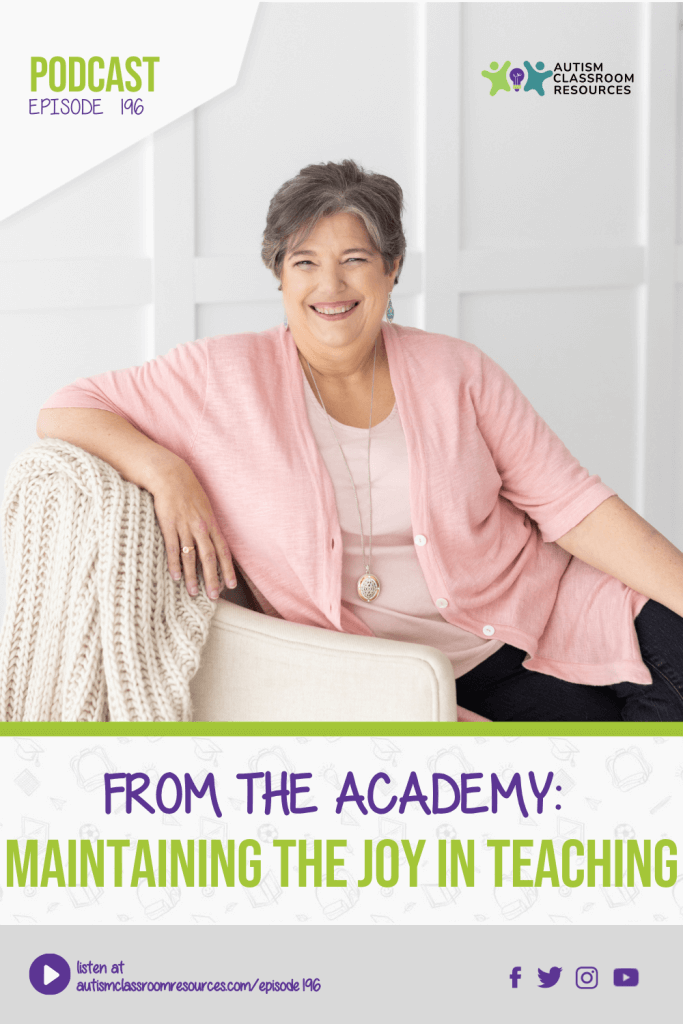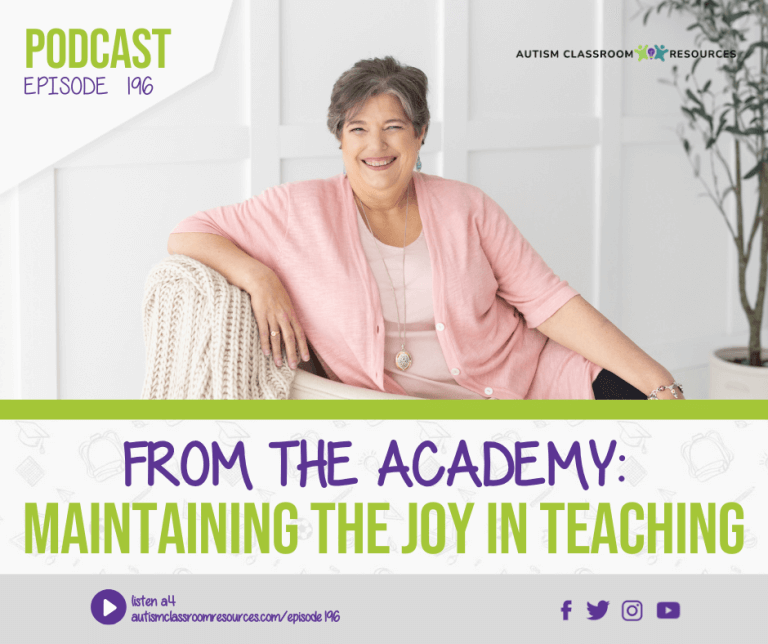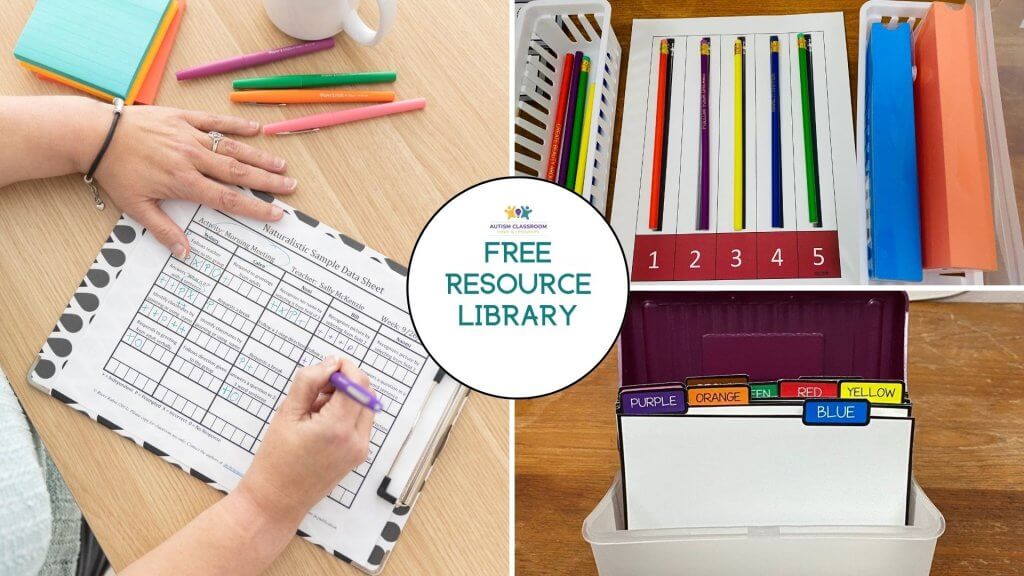Welcome to the Autism Classroom Resources Podcast, the podcast for special educators who are looking for personal and professional development.
Christine Reeve: I’m your host, Dr. Christine Reeve. For more than 20 years, I’ve worn lots of hats in special education but my real love is helping special educators like you. This podcast will give you tips and ways to implement research based practices in a practical way in your classroom, to make your job easier and more effective.
Welcome back to the Autism Classroom Resources podcast. Thanks so much for joining us. This week, I have another special treat. Last week, I had an excerpt from one of the podcasts from the Special Educator Academy. This week, I have another one for you. And it is also about special educator self care. Because part of what I see this podcast doing is helping special educators to be the best that they feel that they can be. And I don’t believe you can do that if you don’t take care of yourself.
One of the things that I know people have been struggling with this year is really trying to remember why we do this job in the first place. There are so many things from staffing shortages, to increased requirements, to all different types of things that are impacting how good we feel in this job. How much we like it. That I thought it would be really useful to pull out this episode that I made for Academy members on how do we maintain the joy of teaching.
I will share some personal experiences that I’ve had, and how I go back to those and how I preserve those to try to preserve the joy of what I do. For most of my career, I was doing consultation to school districts across the whole country. So I was constantly on a plane I was often exhausted, and working with some pretty challenging situations between schools and families, as well as working with some very challenging students that I was called in to work with with behavior.
And I love what I do. I loved what I did. And what I love to do now is being able to share some of that experience with you in hopes that you can continue to maintain the joy in teaching so that you can stay working with your students and giving them what you can give them while maintaining and taking care of yourself as well.
So I hope it gives you some ideas of how to go back to some of those touchstones that keep us going. And I would love to hear what those methods you have for maintaining your joy ain teaching. So hop over to Instagram and hit me up in the DM so you can find me @autismclassroomresources. I would love to hear your experience.
And if you are enjoying the podcast, I would love for you to leave a review on Apple podcasts as well. So I’ll make sure that that link is in the show notes. If you are interested in more content like this, definitely come and join us in the Special Educator Academy. As I said, the podcast is no longer going live. But we have three years of back episodes that you can tune into and download and binge or listen to on your commute. And if you have any questions about that, you can find more information at specialeducatoracademy.com. So let’s get started.
Hi, all this is Chris. I just wanted to let you know, before we get on with our Monday Morning Reflections podcast that this is a replay of a very early episode before we were able to push out the episodes to your devices. And it’s also one that didn’t have a transcript. So I’m bringing some of them back. I’ve selected them specifically because I think they are very relevant for this time and the things that I think are worth hearing again. So I hope that you enjoy it and I look forward to hearing what you have to say.
Welcome back to the Monday Morning Reflections Podcast. I’m so glad you joined us today. In this week’s episode, I want to talk about joy. Specifically about a way to retain the joy of teaching.
We all know the teachers couldn’t possibly decide to teach based on what the pay is. So why do we keep doing this? And often we keep at it because of the light that goes on in our students eyes when they make a connection or they learn something new. And I think that’s a piece that really drives a lot of us.
For some of us that might be the possibility of hearing the first words spoken by a five year old or watching a student build relationships with his peers for the first time maybe, or it could be a look of relief on a family members face when they see that their child can make progress. Or it could be connecting a family with resources in their community when they thought they were left to care for their child alone for the rest of their life.
And, of course, in the midst of those types of moments that are wonderous, we have lots of other moments of frustration, aggression, sometimes students, hopefully not us, advocating for our students that people aren’t attending to and goes unheard, or other stumbling blocks that really block that feeling of joy, where it’s really hard to remember some days why it is you put yourself through this.
So given all of that, how do we maintain those feelings of joy and make them last? Because that high of the joy on those days when things go well, are really what is maintaining us remaining. We need to keep them in the front of our mind because they’re often related to our question of why do you do this.
When somebody says, “Why do you do this?” Think about what your answer is and those are the issues the areas where you find joy.
We’ve talked about mantras in the podcast before and I’ll link to that episode in the show notes. We can use mantras to help us focus on what’s important. And we can also use them to have moments of reflection about what is good in our job and about those joyful moments. So we can certainly use them in one way to build and maintain joy in our jobs in the classroom.
But today, I want to talk about a joy file, or a folder, or whatever you want to call it. It can be a physical file, or it could be a computer file, it could just be a set of pictures. If you’re crafty and you like to scrapbook, it could be a scrapbook. It could be a lot of different things.
But essentially a joy file is when you collect the little things that brought you joy throughout the year into one place, so that you can look at them and make use of them over the course of the year. So it’s essentially collecting the little things that brought you joy. It could be a card that a student gave to you. It could be a sample of a student’s writing and the first time he wrote his name. It could be a note from a parent, thanking you for your dedication to her child. It could even be just something that you wrote down about a win in an IEP that went well.
What you say it may be an actual thing, an artifact or the actual item that you receive from the person. It could also be a win that you shared, say in our community from an IEP that went well. It could be a note that you wrote down to yourself to remember that Jordan said a complete sentence today. Essentially, it can be anything that will trigger that memory for you of that accomplishment, of that win, of that moment of joy.
For instance, I actually wrote a mother’s comment in an IEP down on a card and put it away for me to come back to later. Because it was one of the nicest compliments I’ve received. She told me at the end of the IEP that she felt she had found someone who can think like my daughter. And it just really struck a chord with me that that was really what I was trying to do is to really, the school district and the family were not seeing eye to eye and I was really trying to navigate that and advocate for what the child needed. So to me, that was a really strong compliment.
As you accumulate those memories, you can put them in a file if they’re actual items. Or if you’re like me, and you’re trying to reduce the flood of paper in your life, take a picture of them, put it in an album on your phone labeled “joy” or whatever you want to call it. That way you always have those reminders with you, when you just need to check in and boost your joy a bit on a bad day. There’s something to go back to to remind you why you did this.
However you keep them, the next critical element after collecting them and putting them in your joy folder is making sure that you check it regularly. I like having the things on my phone because when I look at pictures, I tend to come across that album. If you have a physical file of joy, that sounds a little funny when I say it that way, consider getting it out once every week or two weeks, depending on how things are going and reviewing it.
Tell people around you about it. So they know that when you’re having a bad day, to tell you to go back and look at all the amazing things that have happened.
I sometimes will put things on my fridge so that I see them so that they’re not hidden away, if they don’t include confidential information. For a long time, for example, actually, until my last move, I had a note from a teacher I worked with, who really was difficult to get on board with what we needed to do. And it was really a struggle that took us a year or two to get through in terms of providing what this child needed, me giving into the way she wanted to do it, me trying to get her to understand why I wanted her to do certain things. But we managed to work through it. And she saw finally what I wanted her to do, and did it and it worked. So she really experienced success with it.
And when the student we were working with left her class, he was doing tremendously well for him. And he was a really basic skills kind of kid. So the differences were, you know, hard to see sometimes. She wrote me a thank you note. And that note meant so much to me because of our struggle, and because of the great outcome that we have for that student. And because I was so frustrated for two years with her that I put it on my refrigerator because it really meant a lot.
It meant every time I’m frustrated with a teacher, every time I’m aggravated with a family every time I’m, you know, thinking maybe this isn’t what I want to do, it’s something that would remind me that teachers, even when we struggle, often are thankful for what we create in the end.
So go back through your wins in our community, gather up your parent’s end of the year notes or beginning of the year notes or whatever time of year it is. Write down a list of skills that your students learned this year no matter where you are in the year, keep a running list. Keep those good evaluations from principals and put them all where you can review them regularly.
It’s important to recognize that joy is not an emotion that happens to you. It’s not I’m happy, or I’m sad. joy in life is cultivated as much from inside you as those things that happen to you. You make your own joy. It has to come from inside and creating a joy folder is one way to do that.
I’d love to know how you keep your joy in teaching fresh and if you have something similar to a joy file in your life. So I’ll put a link below. Hop over to the community discussion. And I’d love for you to share that with us and give each other ideas of how to keep us focusing on why we do this.
Thanks so much for listening to today’s episode of the Autism Classroom Resources podcast. For even more support, you can access free materials, webinars and Video Tips inside my free resource library. Sign up at autismclassroomresources.com/free. That’s F-R-E-E or click the link in the show notes to join the free library today. I’ll catch you again next week.










